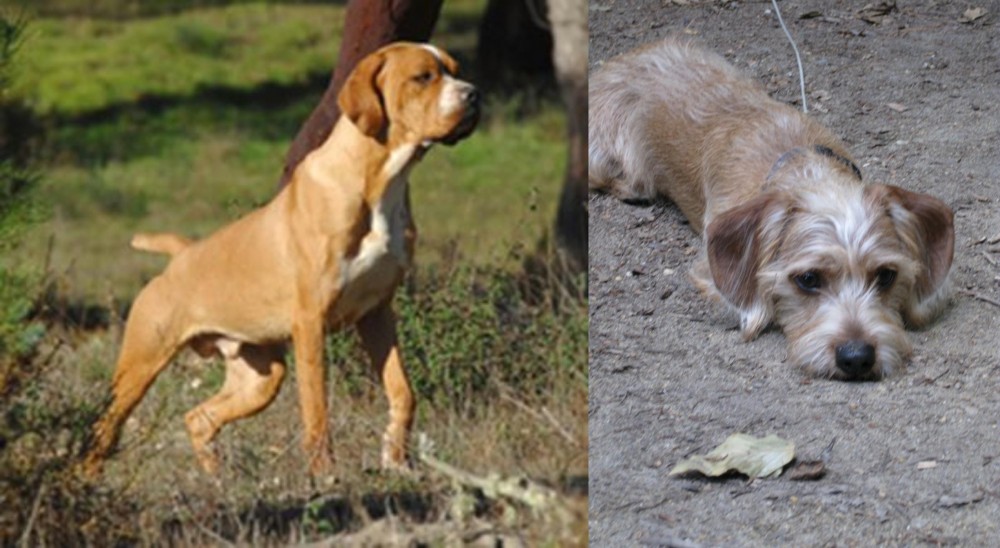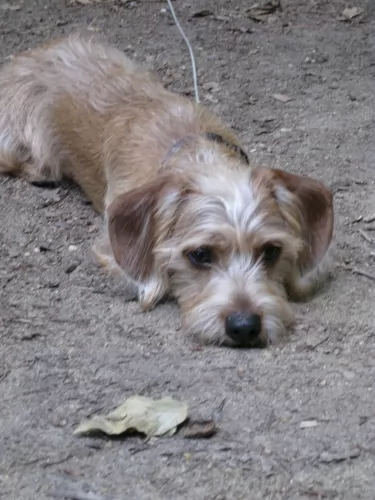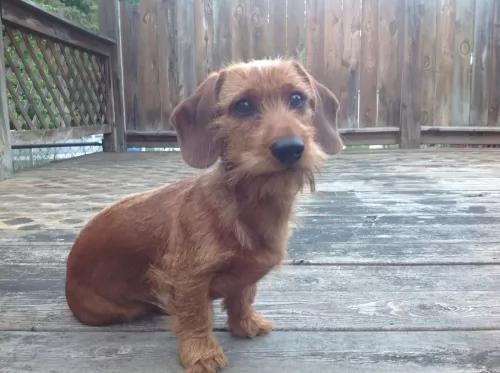 Petzlover
Petzlover Portuguese Pointer is originated from Portugal but Schweenie is originated from United Kingdom. Portuguese Pointer may grow 10 cm / 4 inches higher than Schweenie. Portuguese Pointer may weigh 18 kg / 40 pounds more than Schweenie. Both Portuguese Pointer and Schweenie has almost same life span. Portuguese Pointer may have more litter size than Schweenie. Both Portuguese Pointer and Schweenie requires Low Maintenance.
Portuguese Pointer is originated from Portugal but Schweenie is originated from United Kingdom. Portuguese Pointer may grow 10 cm / 4 inches higher than Schweenie. Portuguese Pointer may weigh 18 kg / 40 pounds more than Schweenie. Both Portuguese Pointer and Schweenie has almost same life span. Portuguese Pointer may have more litter size than Schweenie. Both Portuguese Pointer and Schweenie requires Low Maintenance.
 The Portuguese Pointer comes from Portugal where the dog was developed as a gun dog. It is believed that the dog is descended from the Spanish Pointer and developed to point out game.
The Portuguese Pointer comes from Portugal where the dog was developed as a gun dog. It is believed that the dog is descended from the Spanish Pointer and developed to point out game.
The dog was was recognized by the United Kennel Club in 1996.
The dog was introduced to England in the 18th century and the modern type of the Portuguese Pointer became established in the early 1900’s when the breed had become endangered. A group of breeders re-established its numbers.
Today it is both working- and companion dog. The UK Kennel Club recognised it as a breed in 2014.
 The Schweenie is a hybrid dog, with the parent breeds being the Shih Tzu and the Dachshund.
The Schweenie is a hybrid dog, with the parent breeds being the Shih Tzu and the Dachshund.
The Schweenie dog has been around for about 4 decades when breeders were looking for a dog that would be free of the health issues of the purebred parent breeds.
Because the Schweenie is a mix breed, it doesn’t qualify to be part of the American Kennel Club. He is however recognized by the Designer Breed Registry and some other clubs.
 Originating from Portugal, the attractive, almost Boxer-like looking dog is a medium sized purebred dog that stands at between 48 and 60cm in height and weighs roughly 16 to 27kg.
Originating from Portugal, the attractive, almost Boxer-like looking dog is a medium sized purebred dog that stands at between 48 and 60cm in height and weighs roughly 16 to 27kg.
The Portuguese Pointer has a coat that is light brown, tan or yellow. The dog has a short, easy to maintain coat. He has a fairly square face, much like the Boxer, floppy ears with a long tail. The tail is usually docked. The eyes are brown and he a bright, alert, kind expression.
The Portuguese Pointer is a dog with strong hunting instincts, but who still has time to make a splendid companion for his human family. He is gentle and loyal to his human family, being somewhat reserved with strangers. This is a good thing really as this makes him a good watchdog.
He is good with other pets in the home as well as with children. He badly wants to please his family, and because he is intelligent and a fast learner, you won’t have any trouble with training and socialization.
He is a sociable dog, loving to be close to its owner. He is active and will require quite a bit of exercise, loving to join in with games with the children. He gets on well with children in the home as well as with animals.
 The Schweenie will be a smallish dog standing at roughly 27cm to 50cm and weighing 4 – 9kg.
The Schweenie will be a smallish dog standing at roughly 27cm to 50cm and weighing 4 – 9kg.
Because of the Dachshund parent, he will likely have a long body. The coat is shortish to medium length and can be a variety of colors – from a rusty color to brown, black, grey and even a cream shade. The ears are floppy and the tail medium length.
He is a small dog who is smart and bright and who wants to please his human owners. He loves people and wants to be around them and involved in their activities.
Small and cute though he is, he can be a stubborn dog and become a little big aggressive too if he is feeling a bit moody. He will need to be trained and socialized if you want him to obey your simple commands such as sit, stay, lie down and come.
He is intelligent enough to learn these simple commands with ease.He is both alert and vigilant, and this makes them good watchdogs.
 The gorgeous Portuguese Pointer makes such a loyal and loving pet. He is always looking out for his human family, making sure that they are safe and protected under his watch.
The gorgeous Portuguese Pointer makes such a loyal and loving pet. He is always looking out for his human family, making sure that they are safe and protected under his watch.
He is an excellent watch dog too, proudly running around outside and making sure that there are no intruders around. They are good with kids too if the kids are gentle and kind with animals.
He loves a good game too and is always ready to take part in any activities you’re taking part in. The Portuguese Pointer is truly an awesome pet and companion.
 The Schweenie can be somewhat reserved and they need exercise regularly as well. If they don’t get enough exercise, they tend to become jittery and this can make them become a bit snappy. The are more prone to be snappy and aggressive with children who haven’t been taught how to treat animals gently and with respect.
The Schweenie can be somewhat reserved and they need exercise regularly as well. If they don’t get enough exercise, they tend to become jittery and this can make them become a bit snappy. The are more prone to be snappy and aggressive with children who haven’t been taught how to treat animals gently and with respect.
They’re small enough to adjust to life in the city or countryside but will still need to be exercised.
The little Schweenie, with the right kind of owner can become a great little pet and companion.
 Your robust Portuguese Pointer isn’t known to be a dog to suffer with too many breed related health problems. With good care he can reach 14 years of age.Portuguese Pointers are a healthy breed, but some health issues can crop up -
Your robust Portuguese Pointer isn’t known to be a dog to suffer with too many breed related health problems. With good care he can reach 14 years of age.Portuguese Pointers are a healthy breed, but some health issues can crop up -
Cancer is a leading cause of death in dogs young and old. Luckily, if caught early, cancer is curable. Some of the cancers found in dogs are malignant lymphoma – a tumor of the lymph nodes.
Skin cancer is also fairly common. The warning signs of cancer in dogs can be a new lump or a wound that won’t heal. While these are classic signs, sometimes there are no signs. If your dog isn’t feeling well, it’s time to get him to the veterinarian.
The liver is one of the vital body organs but it is susceptible to a wide variety of problems. It detoxifies the blood, stores vitamins and assists with digestion among other things.
One of the most common symptoms of liver disease is jaundice. When the liver isn’t functioning properly, bilirubin builds up in the blood and leads to the yellowish appearance of the dog.
Other common symptoms of liver disease include vomiting, weight loss and diarrhea. Veterinary attention will be required.
 With good care, your Schweenie can live to be 12 to 15 years of age. Every dog, no matter how healthy, can get some of the health problems that plague many dogs.
With good care, your Schweenie can live to be 12 to 15 years of age. Every dog, no matter how healthy, can get some of the health problems that plague many dogs.
This is where the cushions between each vertebra come into contact with the spinal cord. It can result in nerve damage and sometimes even paralysis. Because the Shih Tzu is one of the parent breeds, you will need to be aware of this ailment as these dogs are more susceptible to this disease.
Hypoglycemia is fairly common in small dogs and it is where there is a drop in blood sugar. It can be brought on by stress. It can also be referred to as low blood sugar and it can be deadly. If your pet is hypoglycemic, you will notice a loss in appetite, extreme lethargy, trembling and unusual behavior. You will need to get your Schweenie to the vet immediately for tests and treatment.
 The Portuguese Pointer has been a working dog and doesn’t enjoy lying around with nothing to do. Apart from a walk every day which he loves, he’ll want other activities that stimulate him mentally and physically.
The Portuguese Pointer has been a working dog and doesn’t enjoy lying around with nothing to do. Apart from a walk every day which he loves, he’ll want other activities that stimulate him mentally and physically.
His short coat means that he won’t require any special grooming. He does shed constantly, like many other dogs, and a good brush twice a week will keep his short coat vibrant and shiny.
Your canine friend will require protein in his diet as well as all the vitamins ad minerals for health. The very best commercially manufactured dog foods will be required for his health.
The dry kibble can be a wonderful convenient way to feed your pet. The best commercial foods meet the requirements for a dog’s diet. Give him some delicious home made food too. Boiled chicken, brown rice, sweet potatoes, carrots and spinach can be cooked in bulk and then chopped up and small portions mixed into the dry kibble twice a week as a treat.
It provides your pet with an alternative to the dry kibble, it is healthy, easy to digest and your pet will love it. Dogs thrive on simple consistency. Once in a while you can also give him some raw meat. Never leave him without a constant supply of fresh, cool water.
 Your Schweenie will need to be brushed at least twice a week to rid him of loose hairs. Because of his floppy ears, you will need to clean them and check for redness. If you don’t like the idea of probing inside the ear, professional groomers or the vet will do it for you.
Your Schweenie will need to be brushed at least twice a week to rid him of loose hairs. Because of his floppy ears, you will need to clean them and check for redness. If you don’t like the idea of probing inside the ear, professional groomers or the vet will do it for you.
Trim his nails if they don’t wear down on their own.
Provide him with a nice dry, warm spot to sleep.
Provide him with nice chewy toys that will keep him occupied.
Exercise him every day. Taking him on walks and playing ball games with him will keep him fit and trim but also help with staving off boredom.
Ensure his vaccines against deadly diseases are up to date. See that he gets to the vet when he appears to be under the weather.
He is a small dog so you have to be careful about how you feed him. You need to feed him a nutrient-rich dry kibble. Read the packaging and buy dog food according to his size, age and activity levels.
Try and include some home-made food into your dogs diet. A little bit of boiled chicken, brown rice or pasta, sweet potatoes, carrots and spinach all chopped up will do him good and can be added into the dry kibble twice a week. Some raw meat should also occasionally be added in as this can help to prevent some skin problems. Be sure that cool, fresh water is available for your pet at all times.